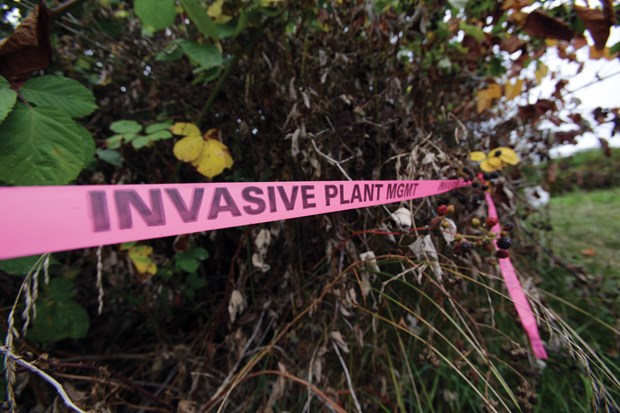The silence was deafening after my June 18 column on invasive plants.
All of my detractors had suddenly gone dark after I presented some basic ecological and financial realities of the war on invasive plants in this province. If you don't think it matters, the war is being fought using our tax dollars at the expense of our environment. Global colonization by plants and animals is a reality of nature. Camels were once native to North America. Ginkgo fossils have been found in Washington State. And I could go on. It's a reality of plant succession and evolution.
It seems the dinosaurs who are supposed to be our leaders are still caught in a 1950s time warp where they believe that the old cold war rhetoric of good versus bad will rally the troops to their cause of stopping invasive plants. And they further believe that pesticides will save humanity from the onslaught of those plants as well as controlling insect pests and plant diseases. How tragic.
As I previously stated: Not one single nonnative or invasive plant has been eradicated from "continental" British Columbia despite trying for the past 100 years. But we still continue to pour millions of dollars and thousands of litres of pesticides into our environment trying to control invasive plants. And the more we spray poisonous pesticides, the more plants and insects genetically evolve and mutate to develop resistance to the very chemicals we are using to fight the war. But you never hear chemical companies or invasive plant groups talk about weed resistance. Despite the fact that more than 100 North American weeds are now resistant to multiple herbicides, including Roundup, due to over-use in the last 60 years.
There are more than 15 invasive plant species groups in B.C. dedicated to controlling non-native plants, and they are not winning the war. But they are spending millions of tax payer dollars fighting for the cause.
The District of West Vancouver states on its website: "Invasive plants are non-native plants that have been introduced to British Columbia where we lack the insect predators and plant pathogens that help keep them in check in their native habitats. They are the second greatest threat to global biodiversity, after habitat destruction."
I found research to the contrary: A review of extinction threats in Canada found introduced species to be the least important of the six categories analyzed: habitat loss, overexploitation, pollution, native species interactions, introduced species and natural causes (Venter et al. 2006).
The District of North Vancouver states on its website that knotweeds reduce biodiversity, reduce food for animals and birds, damage paved surfaces, retaining walls, and building foundations.
If you talk to local beekeepers they will tell you that knotweed is a valuable late summer source of pollen for bees. If you ask me, I will tell you that any large native tree will damage paved surfaces. And plants do not grow into solid concrete foundations looking for food and water where there is none. Even the so called noxious jewel weed (Impatiens glandifera) is a useful food source for bees and beneficial insects.
Despite the anecdotal evidence spouted by warriors of the faith, many of the claims of ecological disaster caused by nonnative plants are being researched and found to be untrue or exaggerated. We should all care about zealots who use our money fighting wars that cannot be won. We should all care about the long term effects of spraying pesticides close to any body of water or on our good earth. We may not suffer immediately but our children will reap the negative health affects of chronic pesticide spraying in our local or regional parks. And spraying to control invasive plants is ongoing in many regional parks run by Metro Vancouver, including Lynn Headwaters Regional Park. And the District of North Vancouver is spraying to control knotweed in Inter River Park. In May 2014 I contacted Bill Morrell, media relations and issues management division manager of Metro Vancouver, via email, to find out how much herbicide is being purchased and applied in our regional parks. My email is still unanswered. Now I will have go to the provincial government and apply for a freedom of information request to get some answers.
Why should you care? Pesticides have damaging effects on children, fish, frogs, soil organisms, birds and even native plants near to the spray operation. Pesticides drift in the air during spraying and leach into the soil and may even translocate to contaminate adjacent plants, like blackberries. And let's not forget the cost to tax payers that amounts to millions of dollars annually, only to be repeated every year into the future. How tragic. How futile. We need you now Ms. Carson. And David Suzuki, would you please weigh in?
Todd Major is a journeyman horticulturist, garden designer and builder, teacher and organic advocate. For advice contact him at [email protected].



